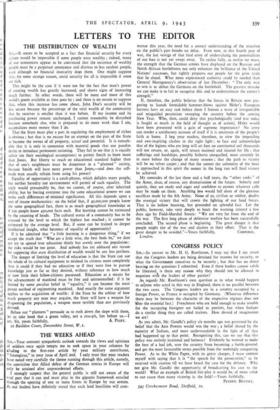THE DISTRIBUTION OF WEALTH Sia,—It seems to be accepted as
a fact that financial security for every citizen would be impossible if some people were wealthy ; indeed, many of our economists appear to be convinced that the existence of wealthy people must be a perpetual annoyance and distress to less opulent people, even although no financial insecurity dogs them. One might suppose that, for some strange reason, social security for all is impossible if some are rich.
This might be the case if it were not for the fact that man's power of creating wealth has greatly increased, and shows signs of increasing much further. In other words, there will be more and more of this
world's goods available as time goes by ; and there is no reason to suppose that, when this increase has come about, John Doe's security will be
less secure because the percentage of the total wealth of the community that he receives is smaller than it was before. If my income and its purchasing power remain unchanged, I cannot reasonably be disturbed because somebody else, who is prepared to do more work than I am, accumulates more money than I do.
That the State must play a part in regulating the employment of riches is obvious ; but that is no excuse for an attempt on the part of the State to become the owner of all property, actual and potential. It is remark able that it is only in connexion with material goods that our pundits desire to introduce permanent rationing. They fail to see that it is equally unfair (on their sociological assumptions) to permit Smith to learn more than Jones. But liberty to reach an educational standard higher than that of one's neighbours must be dangerous in a "planned" society, because Smith will have more power than Jones,—and does the selfmade man usually refrain from using his power?
Equality of opportunity is a catch-phrase, which delights many people, but neither heredity nor environment will permit of such equality. The reply would presumably be, that we cannot, of course, alter inherited
ability, but by forcing everyone into the same educational groove we can make such differences of\ minimal significance. All this depends upon a
sort of insane mathematics: on the belief that, if 45,000,000 people know
the same geographical fact, there is as much geographical knowledge as if zoo people know 450,000 facts each. But learning cannot be estimated
by the counting of heads. The cultural status of a community has to be assessed by the level to which the highest has reached ; it cannot be estimated by the average level. But, if some can be trained to deeper intellectual insight, what becomes of equality of opportunity?
If it be admitted that "a little learning is a dangerous thing," if we accept the truth that "Who are a little wise, the best fools be," we dare not try to spread true education thinly but evenly over the population: the risks would be too areat. And nobody has yet adduced any reason for supposing that even distribution of wealth would be any less perilous. The danger of limiting the level of education is that the State can use the whole of its cultural equipment to mislead its citizens more completely than it could if they had no education or if they were free to pursue knowledge just as far as they desired, without reference to how much or how little their fellow-citizens possessed. Education as a means for the advancement of mankind must be free and untrammelled: if it be limited by some peculiar belief in " equality," it can become the most • potent method of regimenting mankind. And exactly the same argument applies to the acquisition of wealth: if the State be the arbiter of how much property any man may acquire, the State will have a weapon for dragooning the population, a weapon more terrible than any previously devised.
Before our "planners" persuade us to rush down the slope with them, let us take heed that a green valley, not a cess-pit, lies before us.—I
am, Sir, yours faithfully, A. PINEY. 22 Basildon Court, Devonshire Street, W. r.






















 Previous page
Previous page